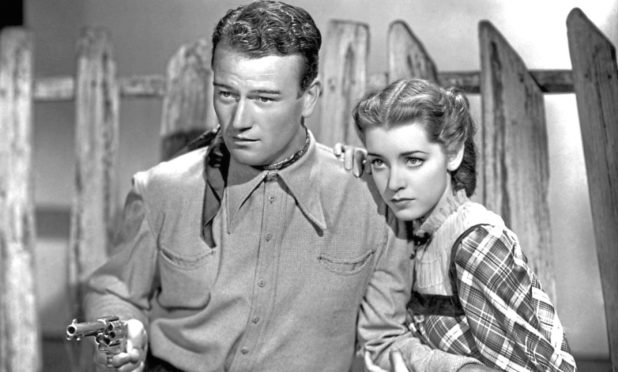
She is the 101-year-old woman with a 73-year acting career who had never wanted to be an actress – but Marsha Hunt was just too good to do anything else.
By her own admission, she was very fortunate to be born into the perfect family, with a protective big sister, a brainy, sensitive father and a very liberated mother.
Which was quite a thing, in Chicago in 1917.
“We didn’t have the term ‘liberated woman’, but my mother certainly was,” Marsha would say proudly. “I lucked into the most fortuitous, warm, constructive kind of family context imaginable.
“My father was a top scholar, my mother a voice coach and accompanist of singers in the concert and opera fields.
“They were wholesome, neither smoked nor drank, and they never used the Lord’s name in vain. I never heard a four-letter word. It didn’t exist in my wholesome family setting.”
Marcia Virginia Hunt, as she was christened, would grow up in this idyllic household alongside sister Marjorie, who would become a teacher.
The last job Marsha would have fancied was film acting, despite the fact that she liked performing in school and church plays.
She did, however, love modelling and by 1935, aged 18, was a high earner.
An unexpected source was responsible for encouraging her towards film.
Zeppo, youngest of the Marx Brothers, saw a photo of Marsha in a newspaper and alerted Paramount Pictures. When a company that size came to you with the offer of a screen test, you would be crazy to turn them down.
She would often play innocent, naive girls – not surprising, given her textbook family background – and she was the perfect foil for John Wayne in 1937’s Born To The West.
If The Duke looked more fresh-faced and less scary than the man we’d come to love, Marsha looked the picture of innocence, and their chemistry went down a storm with audiences.
She would make a dozen Paramount movies in just three years, not to mention a further two on a loan deal with RKO.
They got their money’s worth out of actresses in those days, that’s for sure, but it was all a great learning curve for Hunt and it got her face known everywhere.
There followed a bit of disappointment and self-doubt when her contract ended and she had to make do with a few B-movies, but 1939 brought her back in to the spotlight.
She would star opposite Lana Turner and Lew Ayres in These Glamour Girls, as Betty – a role pretty much made for her.
Marsha also came very close to landing the role of Melanie Hamilton in Gone With The Wind. She was said to be a cert for it until Olivia de Havilland took it on.
Undeterred, she next played Mary Bennet in the 1940 version of Pride And Prejudice – starring Laurence Olivier and Greer Garson – and kept her profile high.
Cheers For Mrs Bishop the following year saw her in the lead role as a Midwest teacher, a job that must have made her teacher sister smile.
It also made MGM sit up and take note, because they signed her on a six-year deal within weeks, and she would go on to star in 21 films for them and become one of the biggest film stars in America.
None Shall Escape, from 1944, was very notable, said to be the first film about the Holocaust. With a setting very much like the Nuremberg Trials, which hadn’t even happened yet, it was powerful stuff.
Marsha played the Polish girlfriend of a Nazi officer, which was also a courageous role for her to take on in those dark times.
In real life, suspicion about people having Nazi or Communist affiliations could have thrown Marsha’s career and life into chaos, as it did with many stars of her day.
The House Un-American Activities Committee angered her, and she and her husband Mike Ratledge joined many stars, including John Huston, Humphrey Bogart, Lauren Bacall and Danny Kaye, in flying to Washington to protest against it.
In 1950, Marsha was secretly blacklisted as a potential Communist. This dawned on her as she realised one job after another was being denied her.
She would go into semi-retirement in this dark period for the United States, but Marsha certainly didn’t avoid politics or shy away from highlighting things about the world that angered her.
Troubled by Third World hunger, she gave speeches across America, founded funds for the homeless, produced documentaries about refugee problems and also worked to help with mental illness, pollution, poverty and other such issues.
Martha also fostered children with her second husband, Robert Presnell. She had had one premature daughter, born on July 1, 1947, who died the next day.
She would later win awards for her contributions to Westerns, and they came back into her life when she appeared in a 1962 episode of Gunsmoke.
Her 1971 movie Johnny Got His Gun won the Grand Prix at that year’s Cannes Film Festival, and she clearly lost none of her talents while in semi-retirement.
A lady ahead of her time, Marsha also fought to help issues around same-sex marriage – and amazed everyone when she debuted a song she had written about it 40 years earlier.
Marsha Hunt, who last performed as recently as 2008, is a woman full of surprises, and her perfect parents would be proud to see how much their youngest daughter achieved.


Enjoy the convenience of having The Sunday Post delivered as a digital ePaper straight to your smartphone, tablet or computer.
Subscribe for only £5.49 a month and enjoy all the benefits of the printed paper as a digital replica.
Subscribe